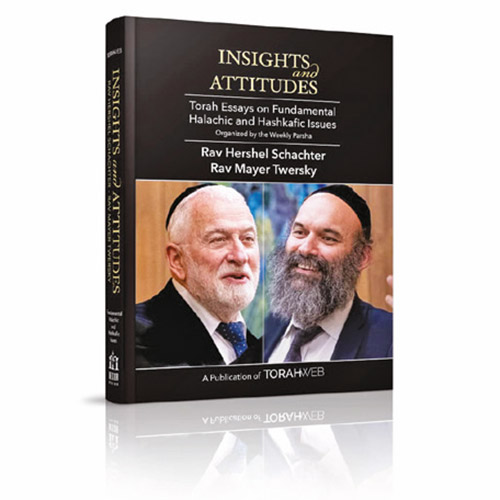
Editor’s note: This series is reprinted with permission from “Insights & Attitudes: Torah Essays on Fundamental Halachic and Hashkafic Issues,” a publication of TorahWeb.org. The book contains multiple articles, organized by parsha, by Rabbi Hershel Schachter and Rabbi Mayer Twersky.
The parasha ends with Yosef HaTzaddik asking the sar hamashkim to repay the kindness he showed him by remembering to try to get him out of prison. The sar hamashkim, however, forgets all about Yosef for two years. According to the Midrash (cited by Rashi, Bereishis 40:23), this forgetting was not a mere coincidence; rather, Yosef was punished with remaining in prison an additional two years for lacking proper bitachon. Yosef should not have requested anything of the sar hamashkim.
The commentaries find this midrash very hard to understand – isn’t it always expected of us to do our hishtadlus and act as though there were no hashgacha peratis? At the beginning of Parashas Vayishlach, we read that Yaakov Avinu prepared himself for his meeting with Esav not only with tefilla, but also with doron and milchama. What was wrong with Yosef asking the sar hamashkim to try to get him released from prison?
To understand this midrash, we must understand what exactly bitachon really means. The Chazon Ish points out that while many think that bitachon means that one in a dangerous predicament should always have the attitude that everything will work out well in the end, this understanding cannot be correct. Why should one assume that the danger will pass without affecting him – was he notified of this by a navi?
Included in emuna is belief in hashgacha peratis. Chazal (Chullin 7b) tell us that “no one hurts his finger in this world if such was not ordained from above,” and, “No one can touch anything that was intended for someone else” (Yoma 38b). Records are kept in heaven on all people, and everyone will get what he deserves. We have emuna that whatever will happen to us is the will of Hashem. Whether we survive or not is up to HaKadosh Baruch Hu, and we cannot possibly suffer if this is not the wish of Hashem.
Bitachon requires that we act in accordance with our emuna, i.e., in accordance with this principle of faith that there is hashgacha peratis. While one must engage in hishtadlus, he should not fall to pieces considering the possibility that he may accidentally (i.e., not in accordance with the Divine will) die, etc. The outcome of all situations is dictated by the will of Hashem, and everything Hashem does is ultimately letov.
The Egyptians of old were known as an ungrateful bunch. As such, for Yosef to ask the sar hamashkim to remember him was grasping at straws; it was a totally ineffective act which would only be engaged in out of desperation. One who has emuna in hashgacha peratis will always maintain his calm and never fall to pieces. Bitachon means that one acts in accordance with his emuna in hashgacha peratis. Losing one’s calm and falling into a state of desperation indicates that one’s belief in hashgacha peratis is not really that strong.
“ברוך מרחם על הארץ” – we believe not only in hashgacha kelalis, that Hashem looks after the entire world with an overall perspective, but also in “ברוך מרחם על הבריות”, that He looks after each person individually, i.e., with hashgacha peratis.
Rabbi Hershel Schachter joined the faculty of Yeshiva University’s Rabbi Isaac Elchanan Theological Seminary in 1967, at the age of 26, the youngest Rosh Yeshiva at RIETS. Since 1971, Rabbi Schachter has been Rosh Kollel in RIETS’ Marcos and Adina Katz Kollel (Institute for Advanced Research in Rabbinics) and also holds the institution’s Nathan and Vivian Fink Distinguished Professorial Chair in Talmud. In addition to his teaching duties, Rabbi Schachter lectures, writes, and serves as a world renowned decisor of Jewish Law.









